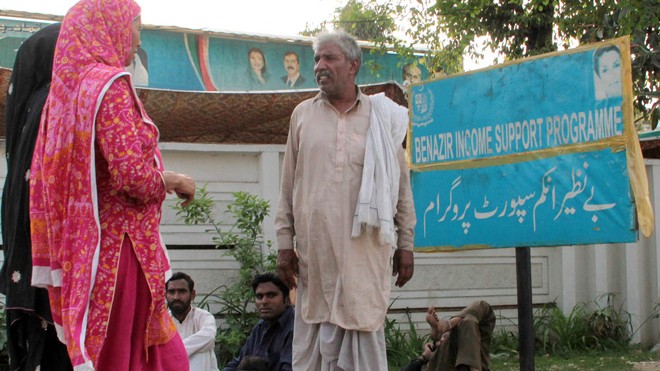
The government needs to change the social protection paradigm to end poverty

To begin with, it is high time for Pakistan’s social protection paradigm to move beyond ‘risk management’ to a holistic approach addressing the issue of poverty instead of focusing on narrow conceptualisation of safety nets and risk management. If Pakistan needs to significantly dent poverty and achieve the target of UN’s first Sustainable Development Goal of Eradicating Poverty in all its forms by 2030, it needs to create a balance between social support and labour market opportunities for the poor.
Social protection has received significant attention as a major instrument to address ‘poverty’ and ‘vulnerability’. Subsequently, cash transfers emerged as a silver bullet to support the poor and destitute living below the poverty line. Pakistan also resorted to this approach and has made considerable economic contribution in the lives of poor through Benazir Income Support Programme (BISP), let alone Pakistan Bait-ul-Mal, Zakat and other initiatives. However, still a large chunk of the populace lives in abject poverty putting question marks on the utility and sustainability of direct cash support to the poor.
Some of the major social protection and social safety net programmes in Pakistan are non-contributory cash supports; Benazir Income Support Program (BISP), Pakistan Bait-ul-Mal (PBM), Zakat, while, others are contributory including Employees Old Age Benefit Institution (EOBI) and Workers Welfare Fund (WWF). But they have had little impact to reduce poverty drastically because they do not ensure any labour market incentive to the poor, which can help them sustain their incomes and livelihoods independently of income support.
Cash transfer programmes, by and large, emanate from the ‘income risk’ reduction concepts. These ‘income risk’ based policies have taken narrow conceptualisation of poverty, limiting it to the income risk only and ignoring multi-dimensionality of poverty and wellbeing. Little effort has been made to link them with the rights of citizens and inclusive development including creating job market opportunities for the poor.
According to Pakistan Economic Survey 2015-16, "29.5 per cent of the population lives below poverty line. The population estimate of 186.2 million for 2013-14 implies that around 55 million people are living below the poverty line in Pakistan". Of those, 18.2 per cent live in urban areas and 35.6 per cent in rural areas.
Whereas, some independent organisations have put the number of people living in poverty higher than those claimed by the government of Pakistan, according to a report of Sustainable Development Policy Institute (SDPI) titled ‘Clustered Deprivation’, 58.7 million people live in multidimensional poverty.
Likewise, Pakistan has a huge gap in the income inequalities vis-à-vis its poor and rich segments of society. According to some estimates, the income inequality widened the gap between the rich and poor. Between the periods between 1987-88 and 2004-05, it increased by 17 per cent.
Nonetheless, achieving first SDG goal of eradicating poverty in all its forms by 2030 seems a distant reality. This worldview is strengthened due to experience Pakistan had with Millennium Development Goals. Pakistan could not deliver completely to the commitments of Millennium Development Goals (MDGs); many of the goals were not achieved or were way behind the target. And now the bar has been set high for SDGs, thus, policy makers need to formulate a strategy which helps achieve the goal of eradicating poverty in all its forms from Pakistan by 2030.
Social protection can be effective in achieving the results of denting the poverty down when there exists a robust labour market. The labour market outcomes for the families and especially for breadwinners are insignificant and un-satisfactory. Just giving money to the poor may not be sufficient for long-standing and intergenerational poverty but labour market opportunities will pull them out of it. Social protection policies may well be combined with the strategy to create and offer poor children and their adults with entrepreneurship and job opportunities.
To achieve the goal of poverty eradication in all its form, Pakistan needs to create a balance between social cash transfers and employment, because both are interlinked in many important ways. "For many households decent employment is the most appropriate route out of poverty and the most effective mechanism of social protection", says Aly Ercelan, development economist.
It is a duty of the government and relevant institutions to create appropriate labour market opportunities for the poor. This is an opportunity for the donors and the government in Islamabad to focus on the provincial social protection policies after the 18th amendment. In post-18th amendment era, the provinces have got greater role and responsibility to address the issues of people.